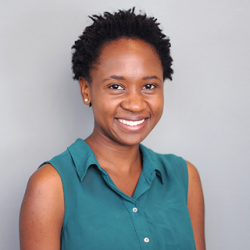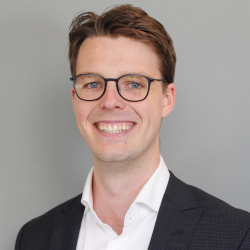Oct. 7: Steffi Muhanji and Wester Schoonenberg, Dartmouth College
Interdependent Energy Infrastructure Systems
About the Speakers
steffi.png

View a recording of this talk.
Steffi O. Muhanji graduated with a Bachelor of Arts in Physics and a Computer Science minor from Vassar College in 2015. She went on to complete her Bachelor of Engineering degree with a focus on energy systems at the Thayer School of Engineering in 2016. In Fall of 2015, Steffi joined the Laboratory for Intelligent Integrated Networks of Engineering Systems (LIINES) as an undergraduate researcher and is now a Ph.D. student. Her research interests are in renewable energy integration, peer-to-peer energy markets, and the energy internet of things. As a graduate research student, she studies the challenges facing the control of the electric power grid given the growing amounts of variable renewable generation. She has written various software models to simulate and understand the performance of the power grid under different scenarios. Recently, Steffi has published a book on the intersection of the internet of things (IoT) and the sustainable energy transition. After graduation, she hopes to utilize the knowledge acquired from her degree to implement sustainable development programs to help mitigate the impacts of climate change.
wester.png

Wester C.H. Schoonenberg is a Doctoral Research Assistant in the Laboratory for Intelligent Integrated Networks of Engineering Systems (LIINES), at the Thayer School of Engineering at Dartmouth. His research interests include Industrial Energy Management & Demand Response and Integrated Smart City Infrastructure Modeling. Wester received his B.Sc. in 2014 from the department of Systems Engineering and Policy Analysis Management at Delft University of Technology and joined the LIINES directly thereafter.
About the Talk: Two major trends dominate the 21st century's changing energy landscape: globalization and climate change. The urban population has significantly increased accounting for over 60% of the world's population living on only 3% of the earth's surface. On the other hand, climate change has led to many challenges that are constantly threatening these urban populations. This requires not only sustainable infrastructure systems that can cater to the growing needs of the urban population but also the resilience of these systems and communities towards the effects of climate change. While decarbonization of key infrastructure systems is paramount, recognising the operational interdependence of various systems such as energy-water, and energy-transportation is necessary to realize their synergistic benefits. This presentation covers the study of such interdependent infrastructure systems from two angles: system structure and system behavior.
In the first part, Wester will discuss his work on the advancement of a Hetero-functional Graph Theory to study the structure of interdependent smart city infrastructure systems. Hetero-functional Graph Theory enables the modeling of multiple coupled unlike engineering systems of arbitrary topology to analyze their structure as well as resilience.
In the second part, Steffi will draw upon two full-scale renewable energy integration studies: The ISO New England System Operational Analysis and Renewable Energy Integration Study (SOARES), and the New England Energy-Water Nexus Study to highlight key challenges facing renewable energy integration and the benefits of actively engaging the demand side. Together, these studies show that energy-water resources and more generally demand-side resources can play a prominent grid balancing role in a decarbonized electricity grid.